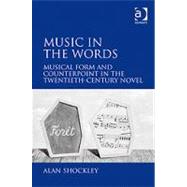Music in the Words: Musical Form and Counterpoint in the Twentieth-Century Novel
, by Shockley,Alan- ISBN: 9780754661993 | 0754661997
- Cover: Hardcover
- Copyright: 6/28/2009
There is a strong tradition of literary analyses of the musical artwork. Simply put, all musicology - any writing about music - is an attempt at making analogies between what happens within the world of sound and language itself. This study considers this analogy from the opposite perspective: authors attempting to structure words using musical forms and techniques. It's a viewpoint much more rarely explored, and none of the extant studies of novelists' musical techniques have been done by musicians.Alan Shockley begins by surveying some prose works from before the twentieth century, as well as a few large-scale poems. He then analyses two brief works, a fugal excerpt from Douglas Hofstadter's Gödel, Escher, Bach, and a short story by Anthony Burgess modelled after a Mozart symphony. Both of these clearly exhibit their musical traits but are less successful as prose (highlighting the inherent conflict between a fugue or a sonata-allegro movement and a traditional narrative).Analyses of three large, emblematic attempts at musical writing follow. The first addresses the 'Sirens' episode of James Joyce's Ulysses; 'Sirens', which Joyce likened to a fugue, has received a lot of misguided attention. Shockley argues that, while Joyce clearly attempts the transformation of the novel's prose into polyphony, he never writes the 'fuga per canonem' of his schemata. Analyses that find specific pitches in letters, and rhythms in puns on their musical labels are simplistic, and always fall short of this episode's musical brilliance.The second large-scale analysis tackles Anthony Burgess' 1973 novel Napoleon Symphony: A Novel in Four Movements, patterned on Beethoven's Eroica. The novel was widely panned by the critics, quickly went out of print, and has received very little attention at all, though it is in fact an intricately woven musical artwork (merely packaged as a novel). Shockley then goes on to scrutinize a few lines of text from Joyce's Finnegans Wake, which he examines as an attempt at composing a fully musicalized language. In this dense text, contrapuntal lines intersect within single words and contrapuntal vertices appear even within single phonemes of Joyce's polyglot neologisms.After these three larger analyses, Shockley discusses some more recent musically-formed novels, including William Gaddis' novella Agapé Agape and David Markson's This is not a novel. Other recent works, such as Cunningham's The Hours and Specimen Days, and Markson's Wittgenstein's Mistress will also be examined.A prose work that actually approaches music will fail as a narrative; it cannot do otherwise. But, such musically driven attempts have much to teach us about the similarities and differences between literary and musical expression.







